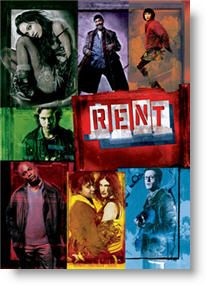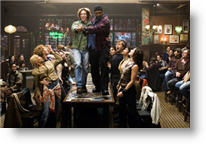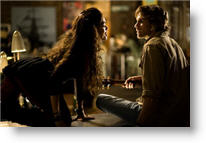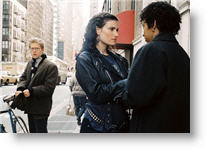Rent
 for mature thematic material involving drugs and sexuality, and for some strong language.
for mature thematic material involving drugs and sexuality, and for some strong language.
Reviewed by: Willie R. Mangum Jr.
CONTRIBUTOR
| Moral Rating: | Very Offensive |
| Moviemaking Quality: |
|
| Primary Audience: | Teens Adults |
| Genre: | Musical Romance Drama |
| Length: | 2 hr. 15 min. |
| Year of Release: | 2005 |
| USA Release: |
November 23, 2005 (wide) |








For a follower of Christ, what is LOVE—a feeling, an emotion, or an action?
What is true love and how do you know when you have found it?

Learn how to make your love the best it can be. Christian answers to questions about sex, marriage, sexual addictions, and more. Valuable resources for Christian couples, singles and pastors.
How to share Christ’s love with homosexuals
What’s wrong with being gay? Answer
Homosexual behavior versus the Bible: Are people born gay? Does homosexuality harm anyone? Is it anyone’s business? Are homosexual and heterosexual relationships equally valid?
What about gays needs to change? It may not be what you think.
Read stories about those who have struggled with homosexuality
Are we living in a moral Stone Age? Philosopher Christina Sommers charges that today’s young people are suffering from “cognitive moral confusion.” They not only have trouble distinguishing right from wrong—they question whether such standards even exist.

Teens! Have questions? Find answers in our popular TeenQs section. Get answers to your questions about life, dating and much more.
| Featuring |
|---|
| Rosario Dawson, Taye Diggs, Wilson Jermaine Heredia, Jesse L. Martin, Idina Menzel |
| Director |
|
Chris Columbus |
| Producer |
| Michael Barnathan, Mark Radcliffe, Chris Columbus |
| Distributor |
"No day but today”
Here’s what the distributor says about their film: “Based on Puccini’s classic opera La Boheme, Jonathan Larson’s revolutionary rock opera ‘Rent’ tells the story of a group of Bohemians struggling to live and pay their rent in the gritty background of New York’s East Village. ‘Measuring their lives in love,’ these starving artists strive for success and acceptance while enduring the obstacles of poverty, ilness and the AIDS epidemic. One of the longest running shows on Broadway, ‘Rent’ was the winner of the 1996 Pulitzer Prize for Drama, the Obie Award, the New York Drama Critics Circle Award, four Tony Awards and three Drama Desk awards.”
If, from a technical and artistic perspective, there were any doubts about Chris Columbus’ ability to direct the film adaptation of a critically acclaimed Broadway musical.doubt no more. With a long string of comedic hits to his credit it is difficult to say that, without doubt, this is one of the best films of Columbus’ already impressive career. That difficulty noted, also note the inherent difficulty of pulling off a musical of any genre, much less a musical drama. This is enough to argue Columbus’ place among the ranks of elite directors like Spielberg, Gibson, Howard, Reiner and others.
The film opens with a stirring recital of the song “Seasons of Love” (the opening song of Act II in the Broadway musical) and asks the question, “How do you measure the life of a woman or a man?” This question sets the film’s tone and establishes the theme that will carry the development arch of the characters.
In philosophy and logic there is a fallacy known as “begging the question.” The one resounding question of this film is value and purpose in life and answers are in short supply. The simple and profound beauty of this question lies in its inherent appeal to the eternal and transcendent. A point that is totally lost in both the stage musical and this film. An incredible ensemble ably directed cannot overcome the hollow ring of emptiness. The question having been asked will be begged throughout the film.
It is this opening scene, however, that begins to reveal the directorial savvy of Chris Columbus. The simplicity of a sparse stage and straightforward “theatrical” lighting highlight the lyric while permitting undistracted story set up. From the stage we move immediately to the loft of Mark and Roger and are introduced to a small group of friends, all struggling artists, living in a neighborhood in the lower east side of Manhattan known as “Alphabet City.”
The title song “Rent” serves to introduce the neighborhood and the players. We soon find out that their former roommate, Benny, is the cause of their misery. He intends to collect from them a whole year’s rent or evict them. He also intends to raze the building and clear the adjoining lot in order to build a high-tech condo and production studio that all of them will use to achieve their dreams.
The film follows the friends as they struggle to come to terms with life on the lower east side in the shadow of poverty, AIDS and the overwhelming tide of the mainstream, represented by their former friend, that threatens to crush their creative heart and conform them to the demands of a material culture.
How do you measure the life of a woman or a man?
In Truths That She Learned,
Or In Times That He Cried,
In Bridges He Burned,
Or The Way That She Died.
This film asks an insightful question and ends up overwhelmingly empty. Can you measure the life of a person in any of these proposed ways? Certainly.
The truths that we learn are of eternal importance. Truth is the plumb line of life, setting the direction and providing the goal that gives life purpose and meaning. Without truth, there is no ability to measure the life of a man or a woman.
The times that we cry and the bridges we burn are significant points in life that fall along that plumb line. Why do we cry? When and for whom do we cry? Which bridges do we burn and why? The line we use to plumb of our lives will dictate these significant events.
Finally, the way that we die will reveal whether or not our plumb line was, indeed, true. And this is where the film falls profoundly short. The plumb line here is self without significant restriction or guidance from truth. The lyric of two songs sufficiently display the error and the emptiness of this film; “Another Day” and “La Vie Boheme.” These songs parallel the resounding chorus of our post-modern era, “truth is relevant, and there are no absolutes.”
The question of Pontus Pilate must reverberate through our minds as we consider the questions and proposed answers of this film. “What is truth?”
The answer to the question is repeatedly on the proverbial “tip of the tongue” in this film. And it is repeatedly spat to the dirt in disdain and mockery. The words of Romans 1:18-32 are very clearly depicted throughout this film. Truth is on display and truth very clearly reveals a crooked and depraved plumb line in the lives of these young artists.
In godlessness and wickedness we suppress the truth. The wrath of God has been revealed from heaven and we see it ever so clearly in the condemnation and death of Jesus of Nazareth. God has pronounced judgment on godless and wicked men and He has fully executed His wrath at Golgotha, the place of the skull, the mount of Calvary, the very place where sin was once and for all judged, condemned and conquered. Eternal punishment was borne and eternal life has been secured, being demonstrated in the resurrection of this same Jesus of Nazareth.
This truth is, at the same time, the plumb line for living and the plumb line for love. Godlessness and wickedness will continue to hold down the truth. Godliness and righteousness must continue to uphold the truth by lifting up the name of Jesus of Nazareth.
This film has no redeeming moral value and I cannot, in good conscience, recommend that anyone go and see it. I can, on the other hand, point out that our response to this film and to the “Rent” players in our real lives, must be according to the same compassion, mercy and grace demonstrated at Calvary and granted to us.
There are no answers in this film. The only real and lasting answers to the questions raised in this film are found in Christ. Our lives must be lived according to the kind of love and compassion He demonstrated to the woman at the well. While He pointed out and acknowledged the sin in her life He also acknowledged the deeper need for the forgiveness and redemption that can usher a soul into true worship. He understood the measure of a life and He has called us to understand and live according to this same measurement.
We are God’s ambassadors, as though God were making His appeal through us and we are called to implore people, on Christ’s behalf, to be reconciled to God (2 Corinthians 5:20-21). Because ‘God made him who had no sin to be sin for us, so that in him we might become the righteousness of God.’
We must so live that we demonstrate the love, grace and mercy of our King.
Violence: Minor / Profanity: Moderate / Sex/Nudity: Moderate
See list of Relevant Issues—questions-and-answers.


Excellent! / 4½
Even if you don’t think you need to see it, see it anyway. Don’t watch it with a critical spirit, counting all the ‘GDs’ and ‘JCs,’ pointing out all of the immorality in it. Ask God to give you His heart for the lost—to weep over our cities the way Jesus wept over Jerusalem. Watch it with compassion, and when you walk out of the theater, resolve to show Jesus’ love to all of the Marks, Rogers, and Mimis of this world. I promise you that you will never be the same.
Average / 5
Very Offensive / 5
Offensive / 5
Technically, the film is among the best that I’ve ever seen. The acting—mostly from the original Broadway cast—was superb. Chris Columbus is an amazing director, and he only proves that with this film. I recommend this film, and I hope that people will go see it. I’m not asking you to “tolerate” what the characters are doing on screen. I didn’t. Lots of it made me uncomfortable, but that’s what sin does. That’s the whole point. These characters are paying the price for their sins, and that’s pretty much what the film is all about. It’s not some feel good romp through the park, although it has some feel good aspects to it. The film is also about hope. About living your life to the fullest. If only these characters had known Christ, their lives could have been so much better. All I can say is go see it!
One word of caution, however: This film is rated PG-13. The director of the film said that he expected an R-rating for the film, but the MPA allowed the PG-13 so teenagers could see it. Chris Columbus also said that he wouldn’t recommend the film for teenagers 13 and under, because it still feels like an R-rated movie—and he would be correct. Take caution.
Offensive / 5
Better than Average / 4
Average / 4
Average / 5
The topics here are heavy, but dealt with in a way that makes it an emotional experience. Perhaps that is what those who walked out before it was over really had a problem with: FEELING the emotions this movie brings out can overwhelm those who are clinging to the rock out of desperation rather than true love. This story is universal, and angry, for the powers that be have largely ignored todays’ LEPERS, in hopes they will just go away. If this movie does only one thing: reminds people that we are ALL God’s Children, it will have served a higher good. Angel’s character is as innocent and pure as a child, and the actor who plays her should be commended, particularly. La Vie Boheme is only one truly fine song: speaking to the soul of those who will fight to be different…
Excellent! / 5
Excellent! / 5
Better than Average / 5
Better than Average / 5
Good / 5
Average / 2½
I most strongly agree with the reviewer’s comments regarding how we as Christians should ACT towards people like those portrayed in the movie. They are homosexuals and lesbians, crossdressers, drug addicts; they are for the most part poverty-stricken and not at all beautiful people. In short, they are exactly the type of people that Jesus would have spent time with and ministered to. It’s a sad fact that we in the Body have done a poor job of both reaching out to and reaching such people with the Gospel. The value for us in this movie may be some knowledge into the lifestyle many of them lead. Knowledge can often lead to insight, and insight will help in sharing the Good News.
The bleakest aspect of the worldview espoused by “Rent” can be summed up in the refrain “no day but today.” This worldview is basically saying that we should live life to the fullest because it’s all there is. This is a philosophy that is both empty and hopeless, and we who know Christ know that it is FALSE. The prophet Jeremiah, speaking for the Lord, said “I know the plans I have for you, plans for prosperity and not for calamity; plans to give you a future and a hope.” It is our responsibility as Christians to make this known to those who do not know the saving grace of Jesus. There are many real-life people like the characters in “Rent”—learning where they’re coming from is essential to providing a context to share the Gospel.
Very Offensive / 5
To those who have not seen the movie but who are considering it, please realize that homosexuality is quite prominent. Also, there is some language. To those who are not sure if they want to see it or not, I will suggest that you maybe stay away. To those who have and who found it extremely offensive, I can only offer my above comments as to what I discovered. We are to approach everyone with the love of Christ, no matter their lifestyle. That’s what Christ himself did.
Very Offensive / 4½
The appeal of this film is in it’s excellent vocalists, lyrics, and in the fidelity of the friendships of the main characters who manage to choose to unconditionally love each other in a disintegrating and degrading urban youth culture. Four of the characters are HIV positive, two from heroine addition (intravenous drug use) and two from the homosexual lifestyle. The hero of the musical, is a drag queen named Angel who lives his life unselfishly and sacrificially for his friends and is truly lovable in spite of his transgendered lifestyle. Open sobbing could be heard throughout the theater as he painfully succumbs to AIDs with the support of his friends. My 13 year old sobbed “Mom, is this really what AIDs does to a person?”, and I was able to spring board a great discussion with her about sexually transmitted diseases, abstinence, drug abuse, etc. from this one question. She asked me in the car on the way home if people who wait until they are married to have sex and never have sex with anyone else could get AIDs. What a great question to answer at just the right time. This one question made the movie worthwhile for me. She had a burning desire to know the truth at that moment.
Another thing faithfully portrayed in the movie was the hell a person goes through when they are addicted to heroine and also when they try to kick the habit. Mimi almost dies in this process, but “true love” revives her and gives her a reason to live. This was unbelievable to my daughter and I and we thought it was a little “corny”.
The movie’s main messages are as follows: “Live only for the moment, and forget the past and the future,” “Accept me as I am and never expect me to change, grow or mature,” “If it feels good, do it,” “My art is my identity and the thing I live and die for,” “My true family are my friends who accept me as I am, flaws and all,” and “Corporate America and work of any kind besides artistic endeavors are evil.” With that said, there is no story of redemption or the need of redemption of any kind in the plot. This is not a movie for anyone who is not well-grounded in a Biblical worldview, especially teens and twenty-something’s, in my opinion, as it glorifies rebellion and demonizes earning an honest living.
I would caution parents of teenage sons that there is a very seductive scene of Mimi at work in a strip club doing a pole dance which would be a temptation for males (probably of any age). Another female character, Maureen, moons her landlord. With that said, I must say I enjoyed the movie, especially the vocal performances. I had compassion and empathy for many of the characters and grieved for their destroyed lives. I was impacted by how completely lost they were and without a clue about God’s provision for redemption through Jesus Christ. Perhaps I will have a greater capacity to minister to young people caught up in some of these lies and show them how to get off the “broad path that leads to destruction, and find the narrow Way that leads to Life.”
Average / 5
Offensive / 5
However, one of the reviewers did have a point: As Christians, we should have compassion for these people, and show Godly love towards them without suggesting that what they do is okay. Jesus would have probably been standing at Angel’s bedside as he was dying, encouraging him and Tom that death does not have to be the end. We should do that more often: Let people like Angel, Maureen, and Mimi in real life know that even though what they do is wrong, we still love them, as Christ loves us.
On the whole, I’d suggest skipping the movie and just getting the soundtrack. You’ll hear the great music, without having to watch the obscene stuff.
Very Offensive / 4
Extremely Offensive / 1
The message of the musical and movie is love and hope in dark times. Some of the characters are dealing with the consequences of their actions which given the Hollywood’s history of only showing the “fun” part of sex and drugs is refreshing to a degree. But to be clear this is a very adult story with very adult themes. People who are offended by homosexuality, drug use, and frank language are advised to avoid this movie.
Very Offensive / 4
Extremely Offensive / 3
Comments from young people
I really do urge Christians to see this film and pray about it! Perhaps it really is not suitable for teens under 15 or so, but for anyone else, it really is valuable. The music is great, and the film overall is really well-made. And of course, be cautious, as in anything you watch. Hopefully, you’ll enjoy it and it will impact your life as it has mine!
Average / 4½
Extremely Offensive / 3½
Average / 5
Open-mindedness is an unsafe way to live, for it gives the Satan (the Adversary) many more opportunities to invade our minds, hearts, and lives. Sarah is right to be disgusted, for it is an abomination to God. To hate homosexuality, doesn’t mean that you hate the homosexual. It goes back to the old phrase: “Hate the sin, love the sinner.”
This is an inspirational movie, a movie about how even though life can present various hardships, you can rise above it. The recurring motif of “No Day But Today” describes this. Everyone in life should live there life to the fullest, and despite the film presents some moral objections, it’s a remarkable tale of survival and the most fundamental human emotion: love.
Offensive / 5
I don’t agree with many aspects of the movie. I do view homosexuality as a sin, and this movie is filled with that particular subject. However, the purpose of this movie is not to convince people that homosexuality is alright, or the way these characters live their lives is completely healthy. The movie has a broader idea it is trying to get across which I feel can touch everyone—not to hate and lookdown upon people for their sins. Though these people have more open sin, like homosexuality, we as Christians are just as sinful through our own faults, and it is wrong to judge them, for we do not want to be judged ourselves. I feel it is worthwhile for all Christians to see this movie; even if you don’t enjoy sinful aspects of the movie, it’s a good experience to see the hurt and pain it brings to these people when they are judged.
All in all, I think it’s an excellent movie, and I would recommend it to anyone who wants to further their understanding of respect and love for others that are not similar to themselves. (Plus, the music is amazing!!)
Offensive / 3½
The film also provides a deep look into the lives of people living with AIDS, and in poverty, as well as not to make judgments about people whom we don’t know. For example, one character, Angel, is gay, and this may cause some people to pass judgment on him immediately. This can blind them from seeing all of the beautiful things about him. He is so unselfish and kind, and teaches us to look for the good in all people.
The only disappointment in this movie is that although the characters preach the theme “no day but today,” for most of the film they aren’t really living that way (except for Angel), and you don’t get to see them start taking control of their lives and really living.
Average / 5
Better than Average / 4
Excellent! / 5

However, if you are unfamiliar with the premise of “Rent”, you should really read about it before going to see it. “Rent” is life from a secular, hedonistic point of view through the eyes of AIDS victims at the turn of the 1980s. The characters search for answers to questions we, as Christians, know can only be answered through Christ, yet they come up with nothing. They decide they must live for the moment—live for love each and every day… to have any purpose or value, and that is their conclusion.
We must remember that Christ would have loved these people just as he loves us. He would have been at Angel’s bedside as he succumbed to AIDS; he would have held Mimi’s hand as she went through withdrawal. God so loved the World, the whole world, and that includes atheistic homosexuals and drug users in New York City.
“Rent” is an amazing film, and I would recommend it to older teens (16 or over) and adults who appreciate the stage version and are acutely aware of the overall morality, worldview and tone of the musical. It is not for everyone!! It must be viewed with an open mind, though, and a logical, analytical spirit as well as a firm Christian base.
My Ratings: Offensive / 5